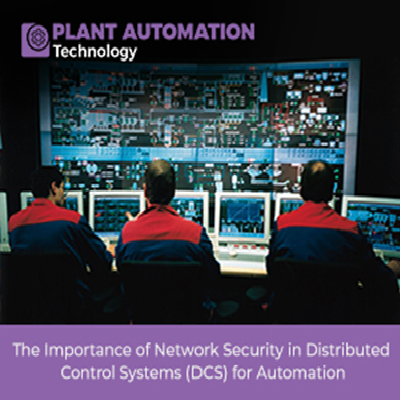The Importance of Network Security in Distributed Control Systems (DCS) for Automation

Introduction
In the ever-evolving landscape of industrial automation, Distributed Control Systems (DCS) have emerged as a fundamental pillar, orchestrating and optimizing complex processes. These systems play a crucial role in various industries, from manufacturing and energy to transportation and water treatment. As the backbone of industrial operations, DCS networks facilitate seamless communication among interconnected devices, controllers, and sensors, enabling real-time data monitoring and precise control.
While the advantages of DCS in automation are indisputable, they also bring to the forefront a pressing concern-network security. As DCS networks become increasingly interconnected, the risk of cyber threats and potential vulnerabilities rises significantly. The consequences of a securityn breach in DCS networks can be far-reaching, from costly downtime and production disruptions to compromised safety and environmental hazards.
This article delves into the critical significance of network security in the context of Distributed Control Systems for automation. It thoroughly explores the potential risks and implications linked to insecure networks, underlining the gravity of the issue with real-world examples. Additionally, the article presents essential best practices and strategies that organizations can implement to effectively safeguard their DCS networks.By examining the importance of network security and offering actionable insights, this article aims to raise awareness and empower readers to protect their industrial processes and data from cyber threats.
Join us on this journey to understand the critical role of network security in the realm of industrial automation, and discover how proactive measures can ensure the reliability, resilience, and continuity of DCS operations in the face of an ever-evolving cyber threat landscape.
Overview of Distributed Control Systems (DCS) and their applications in automation
Distributed Control Systems (DCS) have revolutionized industrial automation by offering real-time control and monitoring capabilities across diverse industries. Their seamless integration of devices, controllers, and sensors through interconnected networks enables efficient coordination of complex processes. From enhancing manufacturing efficiency to powering critical infrastructure, DCS continues to play a pivotal role in optimizing productivity and ensuring smooth operations.
The role of networks in DCS: How they enable communication and data exchange
Distributed Control Systems (DCS) rely on networks to facilitate seamless communication and data exchange between sensors, actuators, and controllers. Operating through local area networks (LANs) or specialized industrial networks like Modbus, Profibus, or Ethernet/IP, DCS networks enable vital real-time communication. This efficient exchange of data empowers the system to respond promptly to changes in the industrial environment and execute precise control actions. By connecting components and providing centralized monitoring and control, DCS networks optimize productivity and ensure the smooth operation of various processes in industries ranging from manufacturing to power generation. Their role remains essential in the advancement of modern industrial automation.
Potential threats and risks posed to DCS networks in industrial environments
In industrial environments, Distributed Control Systems (DCS) networks face significant cybersecurity risks. These critical infrastructures are not immune to cyber threats, making them susceptible to various dangers. Malicious threat actors may seek unauthorized access to the network, aiming to compromise data integrity and disrupt operations. Data breaches pose severe consequences, not only impacting business continuity but also risking sensitive information exposure. Additionally, potential sabotage of DCS networks could lead to hazardous situations, endangering worker safety and causing environmental harm. Common cyber risks include malware attacks, phishing attempts, and unauthorized device access, all of which can result in system downtime and substantial financial losses. Vigilant network security measures are essential to safeguard DCS networks in industrial environments.
Common security vulnerabilities in DCS networks and their implications
DCS networks are susceptible to common security vulnerabilities that pose significant risks in industrial environments. Outdated software, weak passwords, and unpatched systems create entry points for cyber attackers. Additionally, the lack of network segmentation may allow unauthorized access to critical areas. Exploiting these weaknesses grants attackers control over essential processes, potentially causing production disruptions, compromising worker safety, and even leading to environmental disasters. The implications of such breaches extend beyond financial losses, impacting an organization's reputation and credibility. To mitigate these risks, robust security measures, regular software updates, strong authentication protocols, and network segmentation are essential to fortify DCS networks and protect critical industrial operations.
Best practices and strategies for securing DCS networks
To protect Distributed Control Systems (DCS) networks, robust security measures are essential. Best practices include –
- Implementing network segmentation to isolate critical systems, preventing unauthorized access to sensitive areas
- Regular software updates and patching fix known vulnerabilities, bolstering network defenses.
- Strong authentication mechanisms like two-factor authentication add an extra layer of security, reducing the risk of unauthorized access.
- Continuous monitoring of network traffic for suspicious activities and anomalies enables early detection and response to potential threats.
- Regular security audits and assessments ensure ongoing network resilience.
By adopting these strategies, organizations can fortify their DCS networks, mitigating cybersecurity risks and safeguarding critical industrial processes and data.
Security technologies and protocols used to protect DCS networks
Protecting Distributed Control Systems (DCS) networks requires the implementation of effective security technologies and protocols. Intrusion Detection Systems (IDS) and Intrusion Prevention Systems (IPS) play a crucial role in monitoring network traffic, promptly detecting suspicious activities, and blocking potential threats. Firewalls act as robust barriers, controlling incoming and outgoing network traffic, preventing unauthorized access, and filtering data packets. Additionally, Virtual Private Networks (VPNs) provide encrypted communication channels, ensuring secure data transmission between remote locations and central control centers. By deploying these security technologies and protocols, organizations can strengthen the defenses of their DCS networks and safeguard critical industrial assets and information.
The impact of cyber-attacks on DCS networks and real-world examples
The impact of cyber-attacks on DCS networks is profound, with far-reaching consequences and implications. Notably, the Stuxnet worm, identified in 2010, was specifically designed to target Iran's nuclear facilities, causing physical harm to centrifuges and severely hampering uranium enrichment processes. Additionally, the Triton malware, witnessed in 2017, aimed at a Saudi Arabian petrochemical plant, attempting to manipulate safety systems and directly threatening both personnel and the environment. These real-world examples serve as vivid illustrations of the serious nature of cyber threats in industrial settings, highlighting the potential for sophisticated attacks to disrupt critical infrastructure and compromise safety protocols. The incidents emphasize the urgent necessity for robust network security measures to safeguard DCS networks against potential cyber-attacks.
Importance of training and awareness for personnel handling DCS network
The significance of training and awareness for personnel handling Distributed Control Systems (DCS) networks cannot be overstated. Human error and negligence are often contributing factors to security breaches. Comprehensive training programs are crucial to educating employees about potential cyber threats and essential security protocols. By enhancing their understanding of common attack vectors, such as phishing attempts, and promoting vigilant behavior, employees become the first line of defense against cyber-attacks. They learn to avoid downloading suspicious attachments and promptly report any unusual activities, fostering a proactive security culture. Empowering personnel through training and awareness ensures they play an active role in protecting DCS networks and fortifying the overall cybersecurity posture of the organization.
|
Also Read: Integrating IoT and DCS Control Systems for Smart Manufacturing |
Compliance and regulations related to network security in industrial automation
Compliance with network security regulations in industrial automation is paramount to safeguarding critical infrastructure. Regulatory bodies like NIST (National Institute of Standards and Technology), IEC (International Electrotechnical Commission), and ISA (International Society of Automation) have devised comprehensive guidelines and standards for securing industrial control systems. Organizations must adhere to these mandates to uphold industry best practices and fulfill legal requirements. By complying with these established standards, companies adopt a proactive stance towards network security, mitigating potential cyber incidents. Implementing robust security measures in alignment with regulatory guidelines not only ensures a secure environment for industrial automation but also enhances overall resilience against evolving cyber threats.
Conclusion
In conclusion, network security stands as a paramount concern in the realm of distributed control systems for automation. Safeguarding these interconnected networks from cyber threats is essential to ensure the seamless operation, safety, and reliability of critical industrial processes. By adopting robust security practices, incorporating cutting-edge technologies, and fostering employee awareness, organizations can fortify their DCS networks, establishing a formidable defense against potential cyber-attacks. Embracing a proactive approach to network security is pivotal in creating a thriving and secure industrial automation landscape that not only optimizes productivity but also upholds the utmost integrity and safety in the face of evolving cyber challenges.







